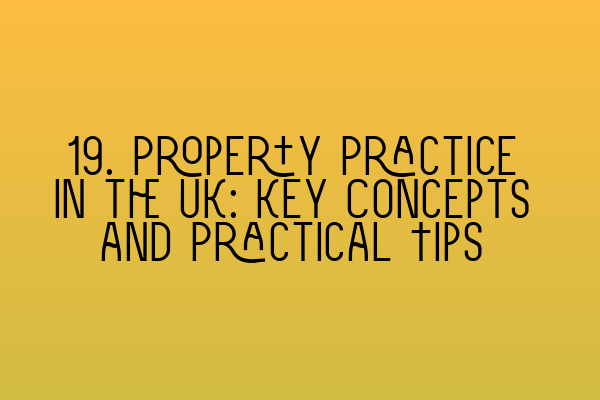19. Property Practice in the UK: Key Concepts and Practical Tips
As a solicitor practicing property law in the UK, it is crucial to have a solid understanding of key concepts and practical tips to effectively navigate through various property transactions. Whether you are dealing with residential or commercial properties, the following information will provide you with valuable insights to enhance your property practice skills.
1. The Conveyancing Process
The conveyancing process is an essential aspect of property practice in the UK. It involves the legal transfer of property ownership from the seller to the buyer. This process typically includes several stages, such as pre-contractual negotiations, exchange of contracts, and completion.
To ensure an efficient conveyancing process, it is crucial to pay attention to detail and address potential issues promptly. Conducting thorough property searches, investigating title deeds, and handling necessary paperwork are critical steps that require meticulousness and attention to detail.
For a comprehensive understanding of the conveyancing process, you can refer to our article on SQE 1 Practice Exam Questions to test your knowledge.
2. Leasehold and Freehold Properties
Understanding the differences between leasehold and freehold properties is essential in property practice. A freehold property grants the owner full ownership rights, whereas a leasehold property provides the owner with a lease agreement to occupy the property for a specific period.
When dealing with leasehold properties, it is crucial to review and understand lease agreements thoroughly. Paying attention to key clauses, such as ground rent, service charge, and lease duration, will help clients make informed decisions.
To further enhance your understanding of leasehold and freehold properties, you can explore our article on SQE 1 Practice Mocks FLK1 FLK2.
3. Land Registration
Land registration is a vital aspect of property practice in the UK. The Land Registry is responsible for maintaining a register of all land and property ownership in England and Wales. Registering land and property offers legal protection, ensures secure transactions, and simplifies the conveyancing process.
When dealing with land registration, it is crucial to conduct thorough searches to identify any potential issues. This includes investigating charges, restrictions, and covenants that may affect the property. Additionally, understanding the priority rules for registered interests and unregistered interests is essential to safeguard your client’s interests.
For comprehensive guidance on land registration and to ensure you are well-prepared, consider enrolling in our SQE 2 Preparation Courses.
4. Commercial Property Practice
Commercial property practice involves various types of transactions, including leases, acquisitions, and development projects. The complexity of commercial transactions requires attention to detail and an understanding of commercial property law.
When dealing with commercial transactions, it is crucial to carefully review and negotiate leases. Understanding and advising clients on rent reviews, break options, repairing obligations, and obligations under the Landlord and Tenant Act 1954 are key components of commercial property practice.
To further develop your expertise in commercial property practice, we recommend exploring our article on SQE 1 Preparation Courses to ensure you are well-prepared for the challenges ahead.
5. Keep Up with the Latest Developments
Property law is constantly evolving, and it is crucial to stay up-to-date with the latest developments. Regularly reviewing recent cases, legislation changes, and industry news will help you provide accurate and timely advice to your clients.
Subscribing to property law publications and attending relevant webinars or seminars will help you stay informed and enhance your knowledge and skills. Additionally, engaging in continuous professional development (CPD) activities will ensure that you are always at the forefront of property practice.
For the latest updates on SRA SQE exam dates and other important information, refer to our article on SRA SQE Exam Dates.
Conclusion
As a solicitor practicing property law in the UK, having a strong grasp of key concepts and practical tips is essential for success. By understanding the conveyancing process, leasehold and freehold properties, land registration, commercial property practice, and staying up-to-date with the latest developments, you will be well-equipped to navigate the complexities of property transactions.
For more resources and guidance on property law, visit SQE Property Law & Land Law. Our team of experts is here to support your property practice journey.
